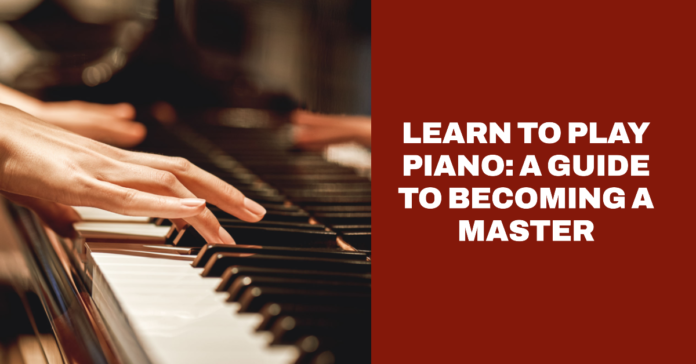Playing the piano is a rewarding activity that helps relieve stress and cognitive, emotional, and personality development. It will also improve your motor skills because it requires excellent hands, feet, and eye coordination.
If you are looking for a way to diversify career opportunities, you can still enroll in piano classes and work as a professional pianist, piano teacher, accompanist, or composer.
To become the best pianist, you must learn the basics and advanced skills from the real pros. The entire piano learning journey requires dedication, practice, and a systematic approach. With that said and done, follow the steps below to achieve your goal of mastering the piano:
Step #1: Start with the Basics
Getting the fundamentals, such as hand positioning and understanding of music notation, builds a robust foundation in Piano playing. It’s also paramount to comprehend a piano’s musical alphabet, which includes (A, B, C, D, E, F, G). Practice, finger exercises, and a comprehension of music theory are equally vital for a strong foundation.
Personalized lessons that will help you learn to play piano are highly recommended for mastery of piano skills. It doesn’t matter whether you’re an expert or a complete beginner; tailored instruction can benefit everyone.
LUMI is the best way to learn Piano because every element of the learning process is designed to offer more fun and spur creativity. The same platform also offers 24/7 coaching, the songs you love, and the piano skills to serve you for a lifetime.

Step #2: Get the Right Instrument
After mastering the basics of piano playing, there are two main piano options to consider. You can buy a traditional acoustic or modern digital piano for easy access and convenient piano playing.
Although acoustic pianos’ touch and tone are unmatched, they are sometimes more costly and require regular upkeep. Digital pianos, on the other hand, are convenient for novices and those with limited space since they are less expensive, more portable, and have more functionality. Considering the feel, sound, and available pedals will lead you to the best choice.
If you want to make the most of your time learning the piano, it’s essential to pick an instrument that appeals to your musical tastes and motivates you to practice.
Many digital pianos provide volume controls and headphones so you can practice peacefully. Some models also have USB or FireWire connections, and you can use it with your computer and music notation software to create your own music.

Step #3: Choose The Best Learning Method
Video tutorials, app-based learning, and traditional lessons are the main pathways to mastering the piano. Each approach has pros and downsides that you should weigh against one another to determine which is best for you.
Conventional piano classes always feature a tutor leading a student through the material. It’s perfect if you need flexibility, individual attention, and inspiration. Regarding piano physical piano classes, locating the best instructor may take time and money.
Sites like YouTube have many video tutorials that cover various piano topics and are typically provided at no cost. Unfortunately, the standard varies widely, and choosing an instructor whose instruction speed suits you may be difficult. In addition, feedback is restricted, which can lead to undesirable habits, and motivation might fade.
The advantages of learning using apps include portability, personalized instruction, and independent development. Apps allow you to learn at your preferred pace and in your own space while providing structure and encouragement. While there is no substitute for human connection, good piano learning applications may make up for it with features like interactive note recognition and a structured learning plan.

Step#4: Start Playing The Piano and Master Advanced Techniques
Learning the piano’s basic structure, notes, and hand movements is essential before moving on to more complex methods. If you want one-on-one help, consider hiring a piano teacher. Consistent practice is the best way to establish muscle memory and learn to play by sight.
To master advanced piano techniques, study the piano playing methods like arpeggios, scales, and expressive playing. It’s also worthwhile exploring many musical genres. Gain self-assurance by studying challenging repertoire and performing whenever possible.
It will be easy to master your advanced piano-playing techniques if you keep studying, go to events, and record your actions for later evaluations. Remember to be persistent, patient, and open to suggestions that will help you to hone your skills and eventually become an expert.

Step #5: Stay Inspired and Continuously Learn
Staying motivated as you learn piano is vital to keep yourself actively interested in music. To keep morale high, celebrate both the small and bigger winnings.
It’s a brilliant idea if you set long-term objectives, expose yourself to various musical styles, and build your repertoire. To feel like you’re making headway on your piano journey, it’s helpful to set both short-term and long-term goals.
To keep your musical curiosity and knowledge alive and growing, listen to various music, from classical to jazz to pop. Adding new pieces to your repertoire is essential if you want to evolve continuously as a pianist. Participating in masterclasses and workshops guided by seasoned teachers may help you learn new techniques and get valuable performance experience.
Conclusion
Mastering piano is easy with proper preparation and dedication to consistent practice. You should start with the basics and the right equipment to learn how to play the piano effectively. It is also essential to choose the best-suited piano learning method.
Whether through video tutorials, apps, or physical classes, continuous learning and staying motivated are key to achieving excellence in piano playing.


